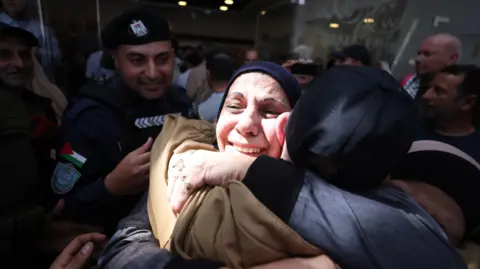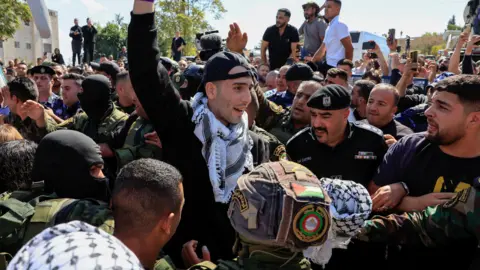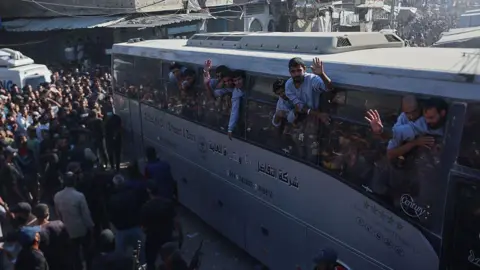Tom BennettRamallah in the occupied West Bank
 Environmental Protection Agency
Environmental Protection AgencyIsrael received hundreds of liberated Palestinian prisoners and detainees with tears and cries of joy after Israel released them to reunite with their families in Gaza and the occupied West Bank.
The release included about 250 prisoners convicted of crimes, including murder and fatal attacks against Israelis – and about 1,700 detainees from Gaza who were held by Israel without charge.
When the prisoners, many of them wearing traditional keffiyeh scarves, exited a Red Cross bus in Ramallah, they looked pale and emaciated, with some struggling to walk.
They were released as part of an exchange in which Hamas released 20 Israeli hostages, and the remains of some deceased hostages are also expected to be released.
“He is ready to embrace freedom,” said Amr Abdullah (24 years old), who was waiting for his cousin Rashid Omar (48 years old), who was arrested in July 2005 and sentenced by an Israeli court to life imprisonment after being convicted of murder and other crimes.
“I want peace,” Abdullah said. “I want to live a happy, safe and peaceful life, without occupation and without restrictions.”
It is believed that around 100 prisoners have been released in the West Bank, with many more scheduled to be deported and a small number released to East Jerusalem.
 Reuters
ReutersIsrael made clear before the release that it wanted to avoid the scenes of jubilation that surrounded the prisoners who arrived in Ramallah during previous hostage deals, when large crowds waved Hamas flags.
Many families were reluctant to speak to the media, saying the Israeli army had warned them not to do so.
In Gaza, families gathered at Nasser Hospital in Khan Yunis in hopes of being reunited with their loved ones. A field hospital was established adjacent to the hospital’s main building to receive them.
Mohammed Hassan Saeed Dawoud, 50, told the BBC that he was there to pick up his son, who he says was arrested by Israeli forces at a checkpoint: “This is a very beautiful feeling, happy, a day of joy.”
He added, “We call it a national holiday, where our prisoners are released despite the cost of war, the martyrs, the wounded, and the destruction in Gaza.”
Khalil Muhammad Abd al-Rahman al-Qatros, who was also there to bring his son, who he said had been detained for about three months, said: “There is joy, there is pain, there is happiness, and there is sadness.”
“We came here waiting for them to be released. We came here expecting them to arrive at 10:00, and now it’s past 12:00, and we’re still waiting, on guard.”
 AFP via Getty Images
AFP via Getty ImagesBefore the prisoners were released, ambulances belonging to the Palestinian Red Crescent Society lined up in Ramallah, ready to treat any injured prisoner.
“The crying and silence show how the families feel,” said Ibrahim Ifeanyi, 23, a volunteer nurse with the organization.
“For all the people in Palestine, it is a deep and profound feeling,” he said.
Several medics and their family members said that prisoners released in Ramallah were beaten in the final days before their release.
The BBC cannot verify allegations of ill-treatment in Israeli prisons. But Israel’s Supreme Court said last month that Palestinian prisoners do exist Not getting enough food.
The British Broadcasting Corporation (BBC) has also previously published reports about the presence of Palestinians He was tortured in Israeli detention centers.
Aya Shreiteh (26 years old) from the Palestinian Prisoners Club said: “Their rights have been violated in the most dangerous ways.”
“Last year most of the prisoners were subjected to deliberate starvation and exposure to disease,” she told the BBC.
“Their bodies are weak from hunger, and they have suffered beatings.”
She added: “But today gives us hope that there will always be inevitable freedom, whatever the circumstances.”
The hostage and prisoner exchange formed part of the first phase of Donald Trump’s peace plan aimed at ending the war in Gaza, which was sparked by Hamas-led attacks on southern Israel on October 7, 2023, in which some 1,200 people were killed and 251 hostages were taken.
Israel launched a retaliatory military attack that killed more than 67,682 Palestinians, according to the Hamas-run Health Ministry in the Strip.
A ceasefire was implemented on Friday – and negotiations are now expected to follow the final stages of Trump’s peace plan.
https://ichef.bbci.co.uk/news/1024/branded_news/3fcb/live/ecdfe520-a833-11f0-9f09-57500e5dbf06.jpg
Source link
